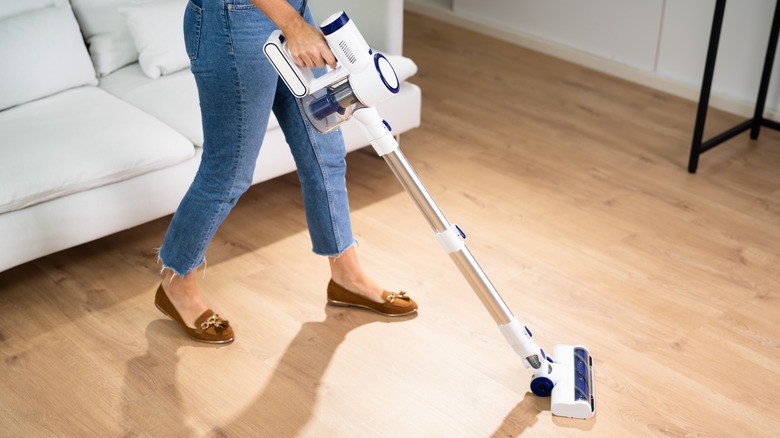The Hidden Benefits Of Your Regular Household Chores On Your Mental Health
As much as your inner child might hate to hear this, research suggests that all those times you were told you needed to clean your room as a kid held more truth than you might've thought. Whether you grew to love (or, at the very least, tolerate) household chores or you still struggle to find the motivation to clean, a study published in BMC Geriatrics shows that these tasks do more than keep your home in tip-top shape.
These everyday tasks help keep you in tip-top shape, too — and in more ways than one. Extensive literature shows positive correlations between a high frequency of household chores and more robust brain and heart health, better mental health, and reduced stress.
We're not saying remembering to vacuum your rugs is a matter of life or death, but the science speaks for itself — chores boost our brain function, mood, and overall quality of life. Keeping our homes looking nice? Well, that's just an added bonus.
Household chores help promote healthy brains and hearts
The 2021 BMC Geriatrics study looked at 66 cognitively healthy older adults between the ages of 67 and 75. Researchers collected data on the participants' brains, including the volume of gray and white matter, and analyzed cognitive performance regarding executive function, processing speed, memory, and attention. Scientists compared this data to how often each participant engaged in household activities.
The data revealed that those who frequently participated in tasks such as cleaning, cooking, and maintaining the home had higher brain volume than those who rarely did these types of chores. Another BMC Geriatrics study published in 2023 dove into these brain-boosting effects further, stating that the increased physical and mental benefits of regularly doing chores can improve survival and lead to a longer life.
Both studies' conclusions coincide with other scientific literature that assessed the effect of low-intensity activity on older individuals. A study published in Clinical Epidemiology found that replacing 30 minutes of inactivity per day with a chore (say, sweeping the floor or tidying the home) reduces all-cause and cardiovascular mortality by 11% and 24%, respectively. Out of all the ways to make your heart healthier, knocking out a few household tasks is a relatively easy place to start. But it isn't just your physical health that benefits from these.
Doing chores can reduce stress and boost mental health
Despite chores' bad reps for being the cause of stress, regularly engaging in household tasks has been proven to reduce stress, boost moods, and improve overall mental health. A University of Connecticut study published in Current Biology found that practices like decluttering and organizing the home can effectively reduce anxiety and "regain a sense of control" in emotionally heightened states. (Yes, that's scientific speak for "stress cleaning is real, and it works.")
Chronic stress can lead to a wide range of symptoms, from memory and concentration problems to moodiness, anxiety, depression, muscle tension, GI disturbances, and high blood pressure, per the Centre for Addiction and Mental Health. While cleaning up the house won't solve all your problems, it's a straightforward way to keep your stress levels and mood in check. If even the thought of doing chores is enough to make your blood pressure rise, try using the four quadrants method to prioritize tasks and become more productive.
If you're feeling far behind on your chore duties, don't worry. Scheduling a catch-up day to take care of tasks you've put off is a great way to tackle your chores head-on without haphazardly cramming them into an already busy schedule. It might take some time to get used to, but eventually, you'll be able to enjoy the benefits of a cleaner home and clearer head.


